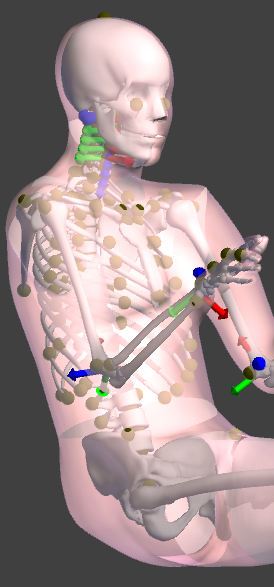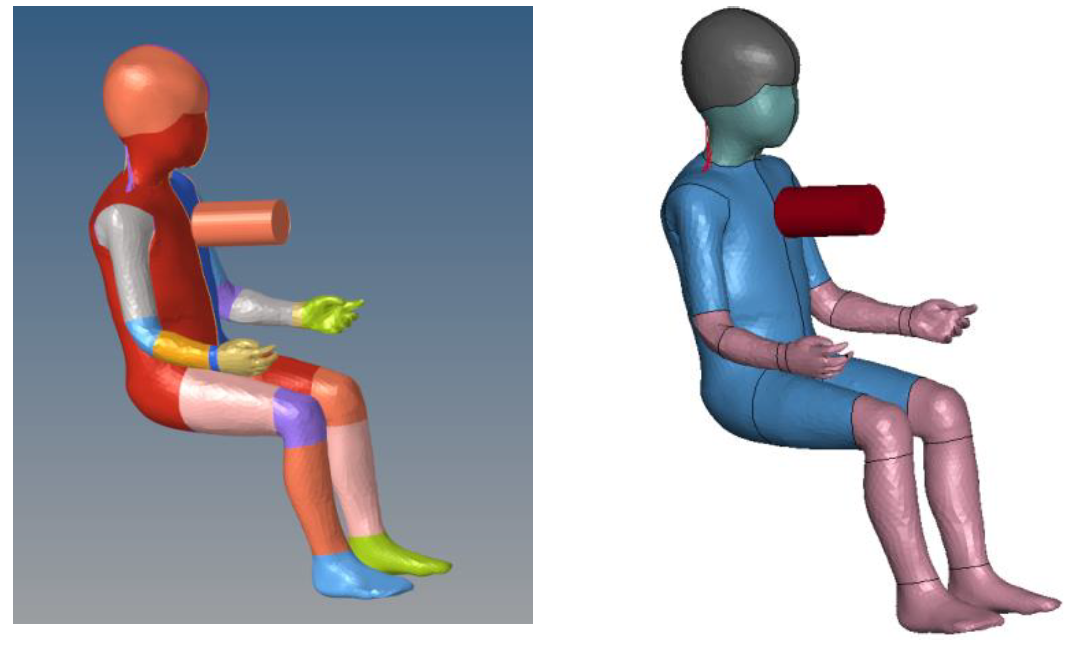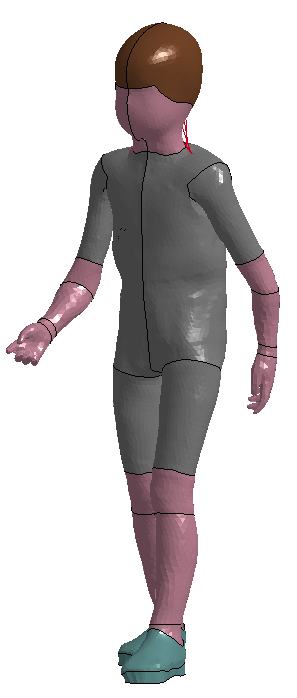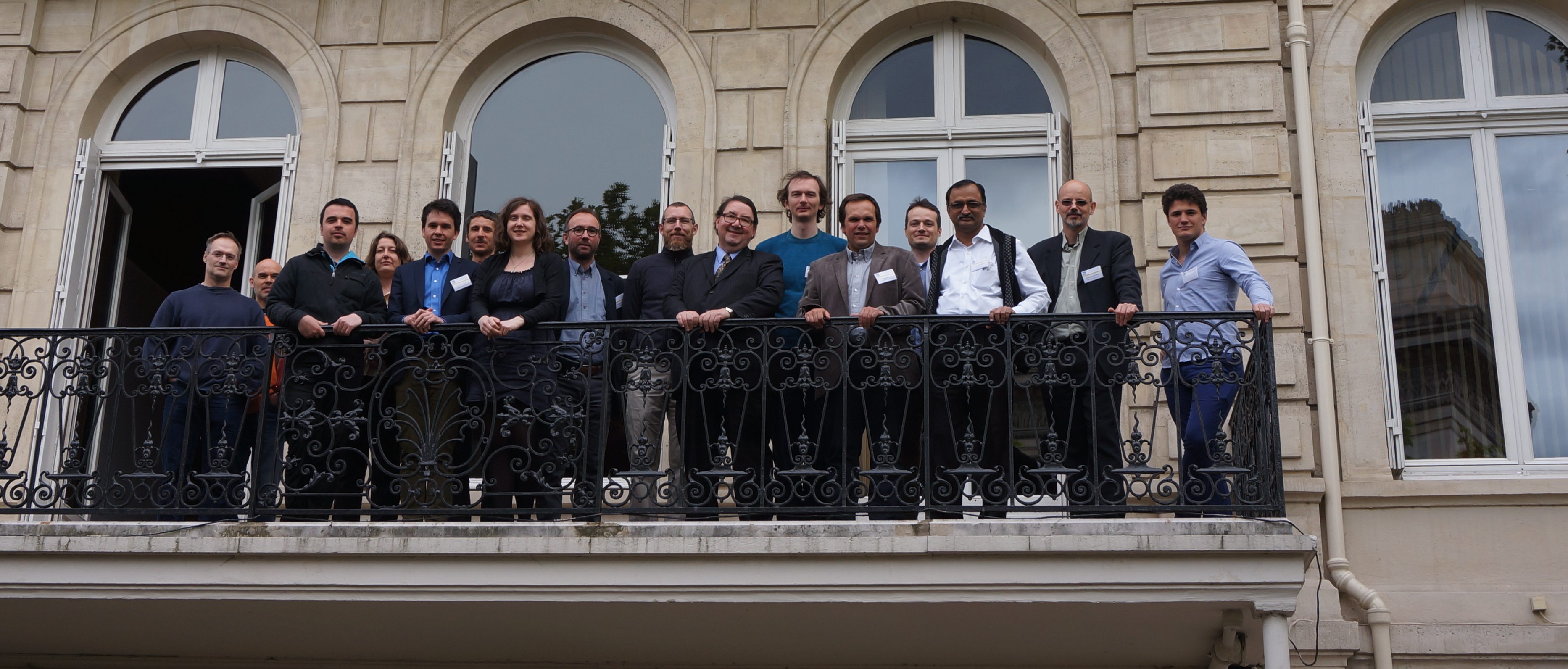User Tools
Sidebar
Table of Contents
Preemie body shapes update
The preemie body shapes representing the 5th, 50th and 95th percentiles were updated to their version 1.0.1. A CAD-model was developed for each body shape, by Magnus Fridsell. The head and limbs of these models can be rotated into different sitting postures. A landmark for the head centre of gravity (CG) was added and can be used together with the CG for the whole body in the assessment of infant car seat design.
Preemie body shapes
Preemie body shapes representing the 5th, 50th and 95th percentiles were developed by Karin Brolin, Victor Alvarez and August Brandberg from lightness.eu. They will be/were presented at the 2024 Ircobi conference. They are available under the same license as the PIPER child in downloads and at https://gitlab.com/piper-project.org/preemie/
Small PIPER Child pedestrian model update
The total mass of the model was adjusted to match the EuroNCAP protocol requirement (it was slightly higher). The instrumentation was also updated to match developments made by TU Berlin on the occupant. It was verified that the changes did not have an effect on the response and the new model tested for the protocol TB024 and used to define new corridor.
A great thank you to Jeremie Peres (PDB) for that contribution. The updates were uploaded to the gitlab and tagged v1.0.2.
Metadata GHBMC M60-O v6.0
The GHBMC M50-O metadata were updated to version 6.0 by Univ. Eiffel (formerly Ifsttar). You can download them in the Metadata section and let the project know if you have problems. Thanks
(2022-04-26)
Migration of the gitlab to gitlab.com
The PIPER git repositories were moved to moved to https://gitlab.com/piper-project.org/
It is now again possible to an account to report issues or to participate.
Everything was imported except the username of the original poster for old issues.
2021-03-08
Problem with the gitlab user accounts
We have been having problems with our gitlab.inria.fr for a little while now repository:
- some users have disappeared
- new users cannot register
We were hoping for a solution in the same place but it is not going to happen and we will need to migrate.
Until we move (we would like to keep most of the information including the posts, usernames if possible so it may take a little while), please use the contact info on this page to ask questions if needed.
Sorry about the inconvenience.
Metadata GHBMC F05-O v5.1
Metadata developed at the University of Waterloo for the GHBMC F05-O v5.1 HBM used for the repositioning and smoothing module. Many thanks to HONDA R&D Americas for sponsoring this work. Download them in the Metadata section

(2020-10-21)
PIPER Child model available in Radioss
A Radioss version of the PIPER child occupant model is now available.
The model is provided with PIPER metadata. It can be used in the PIPER software (please use the version 1.1.0).
Many thanks to Altair for performing the translation from Ls-Dyna to Radioss and for creating the Radioss rule file. You will find the model in the download section. The rule file is now included in the standard PIPER software distribution.

(2020-10-09)
PIPER 1.1.0
A new release of the PIPER software (version 1.1.0) is available. A compiled Windows version is available in the Downloads section.
It introduces several improvements and new features for the Kriging module, such as homogeneous decimation of control points, experimental mesh-to-mesh registration tool to ease generating control points, cleaner user interface and others.
Other changes include improved “element quality” tool user interface, additional selection tools and camera controls and some bug fixes.
Additionally, a format rules file for the Radioss FE solver is now provided (written by Altair). The format rule is written using a new feature of the Piper's parser: regular expression keywords. They allow to specify more complex rules, including keywords that are defined by a variable parameter on the same line as the keyword itself. You can find more details in the documentation in the “Multi Finite Element Format Parser” section.
All changes are summarized in the changelog.
(2020-27-08)
PIPER 1.0.3
New version of the PIPER software. You can download it in the Downloads section. It should solve some issues with the child model scaling and a few others, adds batch mode for Kriging. See the changelog for full list of changes. (2020-04-03)
Metadata GHBMC M50-O v5.0
Metadata provided by PIPER for the GHBMC-M50-O were updated to the v5.0 of the model. Download them in the Metadata section. (2019-10-07)
PIPER Child Pedestrian model in Pamcrash
A Pamcrash version of the pedestrian model was just released in a Pamcrash version. Thanks to PDB and ATD Models for the work! You can download it in the Downloads section. (2019-09-09)
Metadata GHBMC M50-O v4.5
Metadata provided by PIPER for the GHBMC-M50-O were updated to the v4.5 of the model. Download them in the Metadata section.
PIPER used in five studies shown at Ircobi in September
Five studies using PIPER in some form were presented at Ircobi this year. This is great. All but one were completely independent from the PIPER EU project (funding). For the first two studies, specific metadata were developed and none of authors was a partner in the PIPER EU project. We find it is very positive!
The five studies (with links to the papers) are on:
- rear impact with the VIVA Model from University of Stuttgart and Chalmers: the PIPER software was used to preposition the VIVA model (spine predictor and prepositioning modules). PDF
- scaling the Thums for comparison with PMHS data by University of Saragoza, Comillas, Autoliv and Chalmers: the PIPER software was used to scale the Thums (anthropometric module, simplified scaling constraints and kriging). PDF
- playground falls with the PIPER Child model by KTH. PDF
- transforming the PIPER Child model into a pedestrian version by PDB (see release note) PDF
- a study on the transformation smoothing module by UCBL-Ifsttar and LAB Peugeot Renault. Some of the work in that study was funded by the PIPER EU project. PDF
The full program is here.
PIPER was also part of the presentation at the HBM workshop that can be found here.
There will also be presentations at the Human modelling and simulation conference and the Stapp Conference.
Posted 04/10/18
Release of a pedestrian version of the PIPER Child model
The PIPER Child model was adapted to be usable as in a pedestrian configuration by Jeremie Peres at PDB (PDB). It was positioned and tested according to EuroNCAP TB024 and many other small adjustments were done. Additional validation setups were also run.
The model is available under the same Open Source license as the occupant version (GPLv3, etc). It is distributed along with information about the changes and the new simulation setups at the PIPER Gitlab.

Public announcement - 21/08/2018
PIPER at Ircobi 2018
There will be several presentations related to PIPER at the upcoming Ircobi Conference in Athens:
- A study on transformation smoothing will be presented by Tomas Janak (Ifsttar-Univ Lyon1)
- The transformation of the PIPER Child occupant model into the PIPER Child pedestrian model will be presented by Jeremie Peres (PDB)
- A presentation about model positioning with elements of PIPER will be given at the pre-conference workshop on human modelling by Philippe Beillas (Ifsttar-Univ Lyon 1).
Please tell us if you know of other upcoming presentations.
PIPER 1.0.2
A new release of the PIPER software (version 1.0.2) for Windows is available in the downloads section. It addresses mainly several bugs in the Kriging module as well as enhancing some of its features and also resolves some issues related to using piper from a remote network drive. The changes are summarized in the changelog, which you can find on the gitlab repository.
We now also provide a small (3.5 MB) executable that allows you to easily and quickly update Piper from version 1.0.1 to 1.0.2. If you already have Piper 1.0.1, you don't need to download the full (308 MB) package of 1.0.2, the patch contains everything that has changed between the two versions. Just download the patch, run it and it will guide you through the update process. Since this is the first time we have used this tool for Piper, there might be unexpected complications - please let us know in the issue tracker if you experienced any troubles with using the patch so that we can improve it for future releases.
PIPER at conferences
Results using PIPER will be presented at two conferences by PIPER EU project partners in the near future:
- Overview and PIPER status, at the VDI Conference “Human Body Modelling in Automotive Safety” (Nov 28-29, 2017, Berlin). There will be a presentation and a discussion with some ongoing activities. More info on the Conference Website.
- PIPER Child model: application in frontal and side impact (two papers), at the Conference on the Protection of Children in Cars (Dec 7-8, 2017, Munich). The program is available online.
PIPER 1.0.1
A new release of the PIPER software (version 1.0.1) for Windows is available in the downloads section. It addresses several bugs in the Contour, Scaling Constraints and Anthropometry modules. The changes are summarized in the changelog, which you can find on the gitlab repository.
Public web release
After more than three years of development, the team of the PIPER European project is happy to announce the public release (version 1.0.0) of the PIPER software framework and the PIPER scalable child model. They are both released under Open Source licenses (see license files for details) and can be freely used by all, whether academic or commercial users.
The PIPER software can be used to help scale and position Human Body Models for impact. It has been tested with several models during the development phase (including some from the GHBMC and THUMS families, and of course the PIPER child model). The PIPER child model is an occupant model. It is scalable through a dedicated module within the PIPER application and its response was thoroughly checked against many experimental datasets from the literature.
They are provided with documentation and a few tutorials. Videos of the final project workshop are also available. A scientific publication process is still ongoing (be kind and do not rush to publish before the authors).
Access links and more info on this website or on the PIPER European project website (www.piper-project.eu). Future updates will be announced on www.piper-project.org.
The PIPER Team.
Edit: 6/6/2016: new in the download section: links to datasets.
Welcome to piper-project.org
piper-project.org is an Open Source project following the piper-project.eu. Open Source deliverables started being published at final workshop on April 25, 2017 in Paris.
There were many participants from leading industrial and academic institutions at the workshop (Thanks for coming). As requested by some who could not attend, videos (including talks, demos) of the workshop are coming soon. In the meantime, you can already download the slides shown at the event.
Please come back as we will update frequently this page in the upcoming weeks…
Note: small bug in workshop version
It was brought to our attention that there was an error running the anthropometric predictor with the version delivered on USB. It was due to an incoherence between the Octave statistics toolbox provided with the package and the package description. As a quick fix (before we open the gitlab to the public and provide an updated binary version to all with many other bugfixes) replace the file template_octave_packages in the octave/share/octave directory by the one at the following link (octave_package_list.zip) and it should work. Thanks



